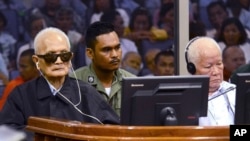Former Khmer Rouge leaders Nuon Chea and Khieu Samphan have been found guilty of crimes against humanity by the Khmer Rouge tribunal’s Supreme Court in a final decision that cannot be appealed.
The decision on Wednesday came more than two years after they were initially convicted and sentenced to life in prison over the mass executions and starvation they presided over between 1975 and 1979.
The Supreme Court, however, found the trial chamber had made mistakes and questionable conclusions during the trial, ultimately reversing some counts of extermination and persecution included in the initial judgment.
The court also found, in a decision likely to stoke controversy, that the decision not to subpoena Heng Samrin, the president of the National Assembly who was a Khmer Rouge commander, was “erroneous.”
The charges were brought for the two men’s participation in the forced evacuation of Phnom Penh and other areas of the country, and the execution of hundreds of officials of the ousted Lon Nol regime.
As the decision was read out, many in attendance applauded.
Chan Socheata, the only survivor in her once-15-strong family, said she remembers the starvation, persecution and forced labor vividly, but was only “a little bit relieved” to hear the decision on Wednesday.
“Prison nowadays is not like during the Khmer Rouge regime, in which we had the right to work but not to eat,” she said.
Keng Ly, 68, who observed the verdict, said his “feelings are somehow soothed.”
“Yet if we talk about the suffering … It was non-stop,” he added. “But this is a modicum of justice for me that I can accept.”
He says he still cannot fathom how people could act with such inhumanity towards their fellow countrymen and women.
“They put forth a killing policy to resolve issues. I still don’t fully understand this policy. Whether it was for propaganda or whatever, I still don’t understand.”
Chea was the regime’s second-in-command, while Samphan was head of state. They are the only senior officials convicted over the crimes of the regime, with Ieng Sary and Ieng Tharith dying before they could stand trial.
The U.N.-backed tribunal has been criticized for the pace at which it has prosecuted cases and for overspending.
Since 2006, more than $260 million has been spent on the court.
Following Wednesday’s announcement, Chan Tani, secretary of the Council of Ministers, said the convictions were a testament to the success of the tribunal.
“It is important to prevent such tragedies from happening again at any time or in any country,” he said.
David Scheffer, special rapporteur for the U.N. secretary general at the Khmer Rouge tribunal, said the verdict should be seen as a warning to other totalitarian governments around the world today.
“Perhaps the leadership of North Korea should take particular note of what occurred here today,” he said.




